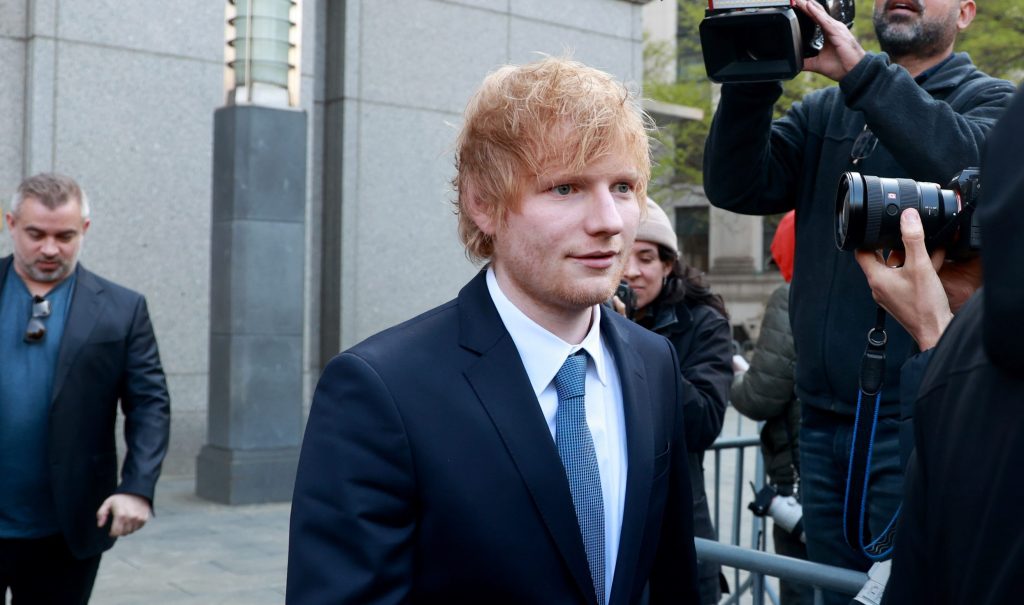Much of the music industry heaved a collective sigh of relief when the news broke Thursday that Ed Sheeran was found not liable on a copyright claim alleging that he copied key elements from the Marvin Gaye ‘70s hit “Let’s Get It On” for his own song “Thinking Out Loud.”
The case is one of countless similar infringement cases that have been brought before courts, settled, or continue in seemingly endless loops of appeals. But there’s little question that recent ones — at least the ones that followed the 2015 “Blurred Lines” decision that shook the industry — have sided with creators.
The lawsuit around Katy Perry’s “Dark Horse” went on for five years before being decided initially in favor of Christian rapper Marcus Gray — who claimed her song was substantially similar to his earlier track “Joyful Noise” — but was overturned in 2020 when a judge ruled that the eight-note “ostinato” Perry allegedly copied lacked the “quantum of originality” to warrant copyright protection (Gray’s appeal was unsuccessful). Later in 2020, the U.S. Supreme Court declined to take up the long-running copyright battle over Led Zeppelin’s “Stairway to Heaven,” leaving in place a ruling that rejected infringement allegations over the 1971 song. The justices denied a petition aimed at reviving the case, ending six years of litigation over claims that the song’s writers, Jimmy Page and Robert Plant, plagiarized the song’s iconic intro from the 1968 song “Taurus” by the group Spirit. https://variety.com/2020/music/news/led-zeppelin-win-stairway-to-heaven-copyright-1234792866/
So does Sheeran’s victory mean that would-be copyright-infringement plaintiffs and attorneys think twice before striking? Variety spoke with veteran attorneys Christine Lepera, who represented Perry in the “Dark Horse” case, and Howard King, who represented Thicke and Williams for “Blurred Lines,” shortly after the Sheeran decision on Thursday.
Lepera believes the Sheeran decision furthers “an evolution of teaching everyone that there are building blocks for music, expression that must be utilized by all songwriters and creators,” she says. “Otherwise, it creates an unreasonable chilling effect on what the copyright act was designed to do, which is to promote creation. There is a music alphabet — there are clearly chords and other commonplace phrases that cannot be monopolized.”
However, while the ultimate “Dark Horse’ decision seemed to support that premise, “Blurred Lines” seemed to say the opposite, basically stating that “feel” can be copyrighted, since it and the Marvin Gaye song were not melodically similar although even Williams admitted they sound similar.
“Well, ‘Blurred Lines’ was based on the law,” Lepera says. “It was based on substantial similarity of protectable expression — at least the jury the jury found that it [was]. But when you’re looking at both Led Zeppelin and ‘Dark Horse,’ what you’ve got is a clear, demonstrative premise that whatever is in common between these two songs is not protectable expression, period.”
Something that presumably didn’t hurt Sheeran’s case was the jury seeing and hearing the artist himself pick up his guitar in court and defend his songwriting — sounding patently offended that people were effectively accusing him of plagiarism. While he has faced similar accusations in the past, to hear an artist who is so often considered nice to the point of annoyance speaking so forcefully doubtless had an impact.
“I think it’s hugely important” to have an artist as an effective witness, says King. “I don’t need to dredge up old news, but this is a problem I had with the ‘Blurred Lines’ case: My artists were not as involved or as engaged as Ed Sheeran was.”
King argues that another factor is the musicologists who are brought in as expert witnesses — and whom Sheeran criticized in no uncertain terms on Monday, saying “I think what he is doing is criminal” of the testimony from Alexander Stewart, a musicologist hired as an expert witness by Gaye’s estate. “I don’t know why he’s allowed to be an expert,” Sheeran added.
King says, “To me, a question [coming from today’s decision] is whether it will persuade musicologists to be a little more careful before just blindly saying ‘I find that the songs are substantially similar’? Because there’s a whole musicology industry that, in my opinion, is a little corrupt in that they’re willing for money to give an opinion that songs are substantially similar, regardless of how dissimilar they are.”
While he agrees that’s an issue with an expert witness in almost any field, King adds, “The problem in a music case is, if you have a jury where no one has a music background, there is a huge reliance on the musicologist. And it becomes what we call a battle of the experts. And who wins? Is it the most articulate musicologist? The most likable? The prettiest? The most experienced? I mean, I’ve been in enough copyright-infringement trials to know that when they start putting up charts showing [musical] notation and stuff like that, it’s very difficult for an uneducated jury to understand.”
It may seem that today’s ruling would discourage future plaintiffs, at least ones seeking recourse due to similar chord progressions, but Lepera isn’t so sure.
“I don’t know whether it will stop people from [pursuing legally] whatever their particular desire is, if they feel they’ve been wronged,” she says. “But what it will do is make everyone realize as across the board, on all sides, that there’s no more no fooling around with respect to this. Music cases are getting a lot more traction in the courts — it’s always been there for literary works and film, where there are generic elements that anyone can utilize, like Girl-Meets-Boy. Now it’s much more at the forefront of people’s psyches.”
King is even less convinced. “I get maybe two copyright-infringement claims a week,” he says, “and at least two actual lawsuits a month. There’s no shortage of plaintiffs and lawyers who bring copyright-infringement cases, and I don’t necessarily think that they’re going to be less motivated.
“I think [Sheeran’s win] is a gratifying victory for artists,” he concludes. “But I don’t think it’s going to present any sea change in litigation.”
Read More About:
Source: Read Full Article

